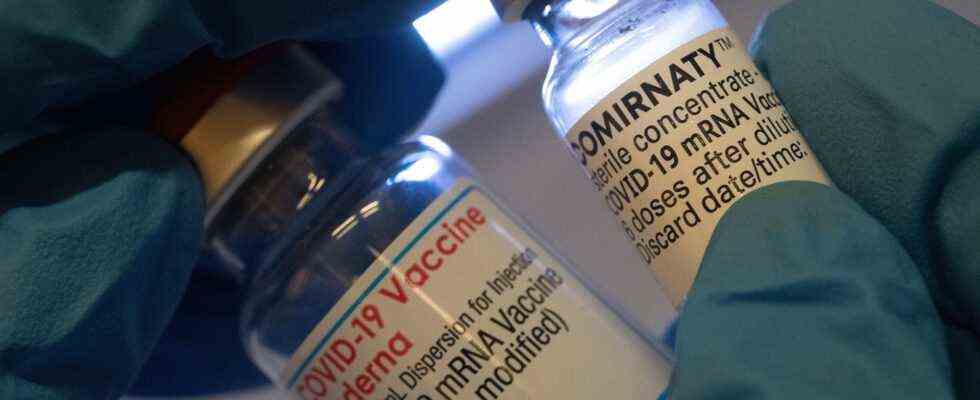fact finder
Status: 11/30/2021 4:22 am
Unsubstantiated reports online: mRNA vaccines allegedly induce cells in blood vessels to produce spike proteins that can trigger heart attacks. But there is no evidence of this at all.
The argument sounds stringent in itself: mRNA vaccines induce cells to produce spike proteins. If the vaccines get into the bloodstream, they also cause the cells in the walls to produce these spikes. The alleged consequence: the walls of the blood vessels are attacked by lymphocytes and antibodies, which lead to thromboses, myocardia (blockages or heart muscle diseases) and even heart attacks.
Stephan Baldus, President of the German Society for Cardiology and Director of the Heart Center of the University Clinic in Cologne, doubts this: “Convincing data showing a connection between mRNA vaccination and vascular inflammation or thrombogenicity [Entzündungen und Verstopfungen der Blutgefäße, die Redaktion] show with appropriate clinical consistency does not exist, to my knowledge and after renewed research in the literature, “he explains to the ARD fact finder.
Criticism of controversial study
One studywho reported an alleged increase in inflammatory markers after mRNA vaccination, is because of possible lack of reliability of the data and insufficient documentation in the Criticism advised. “Even if the results were correct, the clinical relevance would be completely unclear,” says Baldus. Otherwise there are only a few anecdotal indications of possible inflammation and increased blood coagulation. “However, there is no evidence of direct causality in any of the reports.”
According to the cardiologist Baldus, a connection between mRNA vaccines and vascular changes has not been proven.
Image: Stephan Baldus / Photo: Michael Wodak, MedizinFotoKöln
When vaccinating with mRNA vaccines, it cannot be completely ruled out that the vaccine could also reach other cells such as endothelial cells, i.e. those inside the blood vessels. “However, investigations by the European Medicines Agency (EMA) could not detect any uptake of the vaccine by endothelial cells,” explains cardiologist Baldus.
Risk of death from Covid-19 is dimensions higher
The statistical risk of a vaccine-associated death is also extremely low, according to Baldus: “In the USA, the Center for Disease Control and Prevention has given a percentage of 0.002 for vaccine-associated deaths – compared to a mortality of 1.63 percent for which Covid-19 is responsible.”
Evidence of vaccination-related mortality could not be provided by these surveys in any case and might even be overestimated. “The CDC only speaks of vaccine-associated mortality. In any case, it becomes clear that mortality alone has shifted significantly in favor of vaccination – not to mention Covid-19-associated acute and long-term morbidity (Long Covid).”
Cases are closely monitored
This is also confirmed by the data from the Paul Ehrlich Institute (PEI), which as a federal authority monitors the side effects of the vaccinations. in the current safety report the cases of myocarditis and pericarditis (inflammation of the pericardium) are itemized:
| Age group | Corminaty | Spikevax | ||
|---|---|---|---|---|
| men | women | men | women | |
| 12-17 | 4.81 | 0.49 | 11.41 | – |
| 18-29 | 4.68 | 0.97 | 11.71 | 2.95 |
| 30-39 | 1.88 | 1.11 | 4.67 | 1.12 |
| 40-49 | 1.12 | 0.93 | 2.13 | 0.80 |
| 50-59 | 0.71 | 0.77 | 0.99 | 0.91 |
| 60-69 | 0.38 | 0.29 | 0.31 | – |
| 70-79 | 0.47 | 0.25 | 0.50 | 0.45 |
| 89+ | 0.18 | 0.13 | 0.47 | – |
| total | 1.57 | 0.65 | 3.78 | 1.09 |
Together with the register for children and adolescents with suspected myocarditis (MYKKE register), the PEI records the Suspected cases of myocarditis in children and adolescents after a Covid-19 vaccination. All known cases are looked after in accordance with the standards for diagnosis and treatment and are followed up for at least twelve months.
According to the PEI, several studies on the potential risk of thrombosis of the Covid-19 vaccines have so far not provided a consistent result. If SARS-CoV-2 infections and the risk of thrombosis were also examined, the risk after infection with the Sars-CoV-2 virus was always higher than after vaccination.
So there is no evidence to support the claim that mRNA vaccines induce cells in blood vessels to produce spike proteins and thus trigger heart attacks. All available data show that the protective effect of vaccinations exceeds the risk of side effects many times over. Therefore, experts and vaccination committees also urgently recommend vaccinations to protect against infections and, above all, severe courses of Covid-19.

